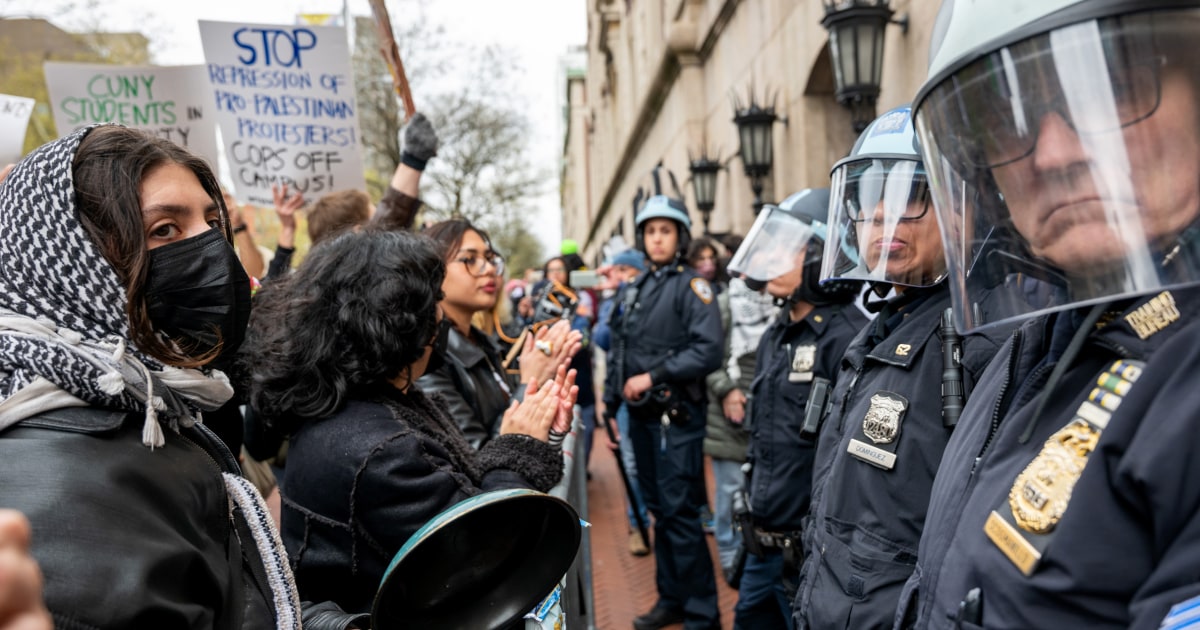Arrests, suspensions, canceled commencements.
What should have been a season for celebrating the waning academic year is being overshadowed by a tug-of-war between college students who oppose Israel’s military actions in Gaza and university administrators cracking down on widespread protests.
More than 2,600 students have been arrested across the U.S. in recent weeks, The Associated Press reported, as universities that were once havens for free speech contend with escalating campus unrest, including violent confrontations with counterprotesters and aggressive law enforcement officers.
On Tuesday, student protesters at the University of Chicago received a notice from administrators threatening to arrest and place them on “emergency interim leave of absence” if they did not immediately abandon their encampment.
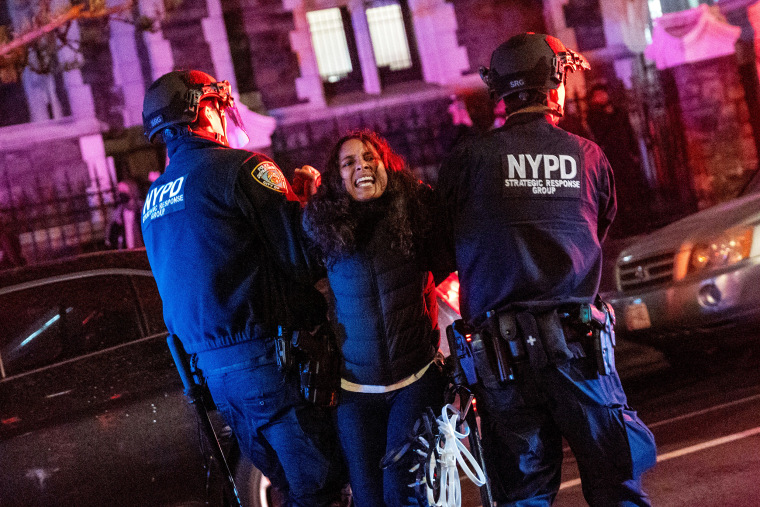
Instead, many linked arms and formed a human chain in direct defiance of campus police officers who had dismantled the protest area hours earlier.
Graduate student Christopher Iacovetti said he was asleep in a tent around 4:30 a.m. when university police first descended on the pro-Palestinian encampment.
“They stormed in aggressively — screaming us down, chasing us around, ramming us with shields and so forth,” he said. “It was hideous, it was ugly, and it was, above all, cowardly.”
Administrators initially tolerated the protest when it started early last week, but that had changed by Friday, when President Paul Alivisatos warned in a letter to the university community that demonstrators had violated policies and that the encampment “cannot continue.”
After it was torn apart, Alivisatos said in a statement that he had given students plenty of warning to avoid escalation.
“Protest is a strongly protected form of speech in the UChicago culture, and the demonstrators had multiple opportunities to express their views,” he said. “But many aspects of the protests also interfered with the free expression, learning, and work of others. Safety concerns have mounted over the last few days, and the risks were increasing too rapidly for the status quo to hold.”
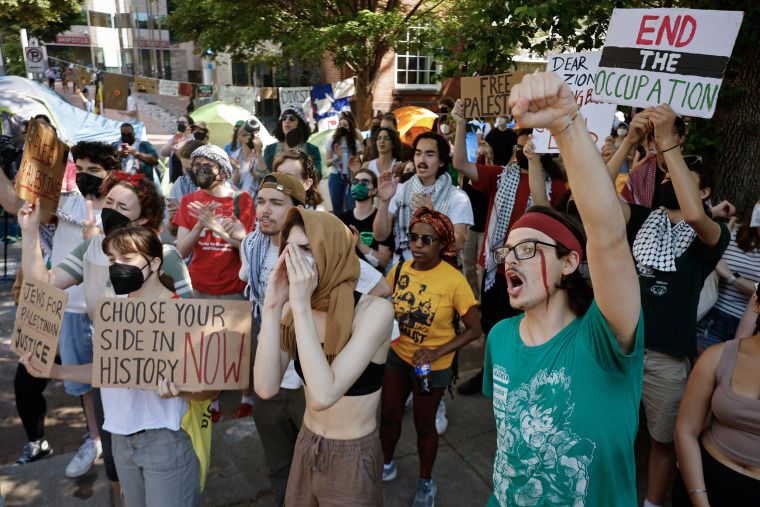
Eman Abdelhadi, an assistant professor of comparative human development, said Tuesday’s actions by the university were disappointing and shocking after its initial openness.
“I think it’s really a sad end to a space that has felt like a community space and healing and grieving space for the entire neighborhood,” she said, adding the antiwar movement will not be dissuaded.
“Our students are incredibly brave and smart and sophisticated,” she said. “I’m proud of them every day for the work that they’re doing.”
The about-face in Chicago reflects a broader frustration experienced by both students and administrators across the country.
Nearly three weeks into a movement launched by a protest at Columbia University in New York City, the Rhode Island School of Design held talks with protesters occupying a building, and the Massachusetts Institute of Technology dealt with a new encampment on a site that was cleared but immediately retaken by demonstrators.
MIT officials said Tuesday that “dozens of interim suspensions and referrals to the Committee on Discipline are now in process.”
Bill Townsend, CEO of College Rover, a university comparison tool for prospective students and their parents, said universities are embarking on “the slippery road to self-censorship and society’s unwillingness to be uncomfortable.”
“Colleges want to be at the forefront of controversial subjects but do not seem capable of handling the pressure put back on them,” he said. “Now, of course, safety is paramount — but this seems uncalled-for.”
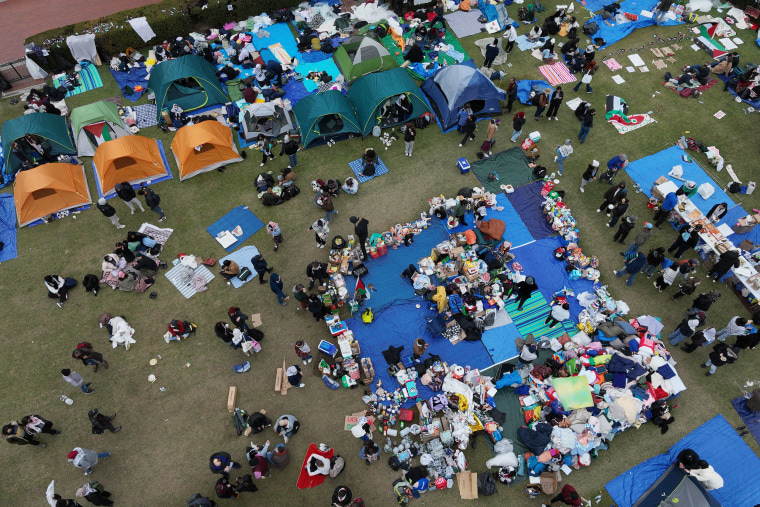
Since April 17, when largely peaceful protest encampments first appeared at Columbia University, administrators have struggled to balance free speech with securing campuses and protecting students, the majority of whom are not participating in the protests.
The University of California, Berkeley, which became the first campus in California to join the encampment movement last month, has remained largely peaceful. No stranger to protests, the Bay Area university has focused on creating an open dialogue between administrators and pro-Israel and pro-Palestinian students, university spokesman Dan Mogulof said.
“We’ve been down this road before,” he said. “We’ve drawn from our own experience and the experience of others that the utilization of law enforcement, while sometimes necessary, can have unintended consequences.”
In a similar vein, the president of Wesleyan University in Connecticut wrote an opinion piece this week explaining why the encampment there will be allowed to stay.
“This is a protest directed at the administration, and I don’t get to choose the protesters’ messages,” President Michael S. Roth, who opposes the war in Gaza, wrote in The New Republic. “I do want to pay attention to them.”
At the University of North Carolina, Chapel Hill, antiwar student protesters called on faculty and teaching assistants Monday to withhold reporting official grades until the school gave amnesty to students who had been suspended for protesting.
The university rejected the demand and said any instructor who withheld grades would be subject to sanctions.
“We strongly support the right of faculty and graduate students to express their opinions freely but there are better ways to do this than hurting our students and abrogating our contract with the people of North Carolina who support our university,” officials said in a statement.
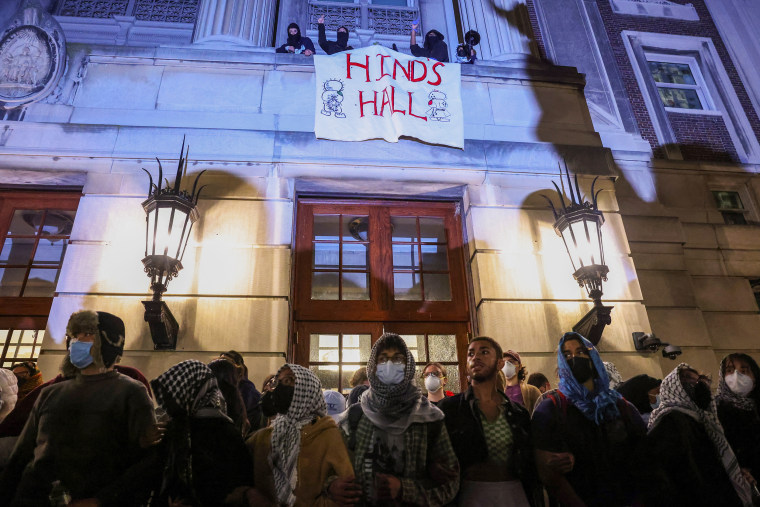
On Monday, Columbia became the latest institution of higher learning to have rethought graduation plans following weeks of increasingly chaotic protests that culminated with the arrests of at least 80 students.
Administrators canceled the universitywide ceremony in favor of smaller, independent ceremonies for associated colleges. The decision was made after discussions with student leaders amid security concerns, the university said in a statement.
New York Mayor Eric Adams this week praised area universities for how they handled the protests, saying many were caught off-guard by the campus unrest.
“Columbia and all of these presidents were hit out of nowhere with something that no one could have thought about,” he told reporters. “And I really take my hat off to them. It was a very difficult time.”
Last month, the University of Southern California in Los Angeles canceled its main commencement ceremony, which would have included a keynote address from alumnus Jon M. Chu, director of “Crazy Rich Asians,” a presentation of honorary degrees to tennis star Billie Jean King, and high-profile speakers.
The decision was made shortly after USC said its valedictorian, a South Asian American Muslim woman, would not be allowed to deliver the customary commencement speech because of threats to her and the university. School officials never said what the threats were or who made them.
At UCLA, violent clashes between protesters and counterprotesters led school officials to call in officers and deputies, resulting in dozens of arrests and an independent investigation into why administrators were slow to seek help from law enforcement.
